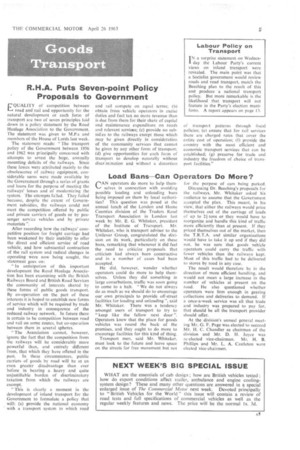Load Bans—Can Operators Do More?
Page 7

If you've noticed an error in this article please click here to report it so we can fix it.
rAN operators do more to help them
selves in connection with avoiding possible loading and unloading bans being imposed on them by local authorities? This question was posed at the annual lunch of the London and Home Counties division of the Traders Road Transport Association in London last week by Mr. E. G, Whitaker, president of the Institute of Transport. Mr. Whitaker, who is transport adviser to the Unilever Group, congratulated the division on its work, particularly on these bans, remarking that whenever it did feel the need to criticize proposals that criticism had always been constructive and in a number of cases had been accepted.
He did, however, wonder whether operators could do more to help themselves. Unless they did something in large conurbations, traffic was soon going to come to a halt. "We do not always do as much as we should do to encourage our own principals to provide off-street facilities for loading and unloading ", said Mr. Whitaker. There was a tendency amongst users of transport to try to "keep like the fellow next door ". Operators knew that the place for goods vehicles was round the back of the premises, and they ought to do more to encourage facilities for this kind of thing.
Transport men, said Mr. Whitaker, must look to the future and leave space on the streets for free movement but not for the purpose of cars being parked.
Discussing Dr. Beeching's proposals for the railways, Mr. Whitaker asked his audience to assume that the Government accepted the plan. This meant, in his view, that either the railways would price themselves out of the carriage of loads of up to 2} tons or they would have to reorganize and handle this kind of traffic more efficiently than at present If they priced themselves out of the market, then the T.R.T.A. and similar organizations would have to take it up and if they did not, he was sure that goods vehicle operators could carry the traffic with fewer vehicles than the railways kept. Most of this traffic had to be delivered to stores by road in any case.
The result would therefore be in the direction of more efficient handling, and would not mean a large increase in the number of vehicles at present on the road. He also questioned whether operators were firm enough in gearing collections and deliveries to demand. If a once-a-week service was all that trade and industry was prepared to pay for, that should he all the transport provider should offer.
At the division's annual general meeting Mr. G. F. Page was elected to succeed Mr. H. C. Chandler as chairman of the division and Mr. D. H. Joyce was re-elected vice-chairman. Mr. H. B. Phillips and Mr. L. A. Castleton were elected vice-chairmen.












































































































